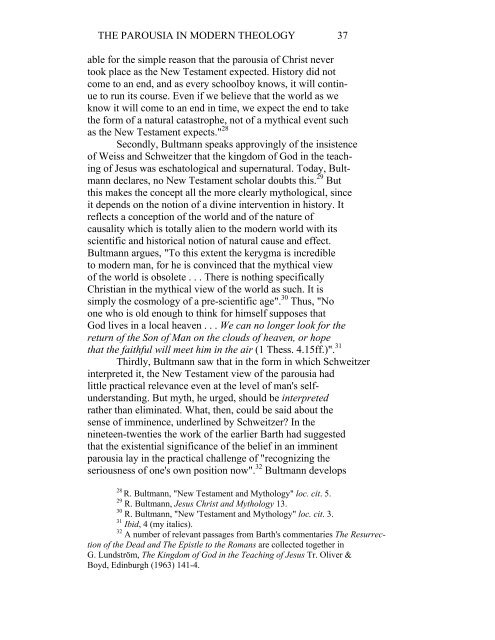the parousia in modern theology: some questions ... - Tyndale House
the parousia in modern theology: some questions ... - Tyndale House
the parousia in modern theology: some questions ... - Tyndale House
You also want an ePaper? Increase the reach of your titles
YUMPU automatically turns print PDFs into web optimized ePapers that Google loves.
THE PAROUSIA IN MODERN THEOLOGY 37<br />
able for <strong>the</strong> simple reason that <strong>the</strong> <strong>parousia</strong> of Christ never<br />
took place as <strong>the</strong> New Testament expected. History did not<br />
come to an end, and as every schoolboy knows, it will cont<strong>in</strong>-<br />
ue to run its course. Even if we believe that <strong>the</strong> world as we<br />
know it will come to an end <strong>in</strong> time, we expect <strong>the</strong> end to take<br />
<strong>the</strong> form of a natural catastrophe, not of a mythical event such<br />
as <strong>the</strong> New Testament expects." 28<br />
Secondly, Bultmann speaks approv<strong>in</strong>gly of <strong>the</strong> <strong>in</strong>sistence<br />
of Weiss and Schweitzer that <strong>the</strong> k<strong>in</strong>gdom of God <strong>in</strong> <strong>the</strong> teach-<br />
<strong>in</strong>g of Jesus was eschatological and supernatural. Today, Bult-<br />
mann declares, no New Testament scholar doubts this. 29 But<br />
this makes <strong>the</strong> concept all <strong>the</strong> more clearly mythological, s<strong>in</strong>ce<br />
it depends on <strong>the</strong> notion of a div<strong>in</strong>e <strong>in</strong>tervention <strong>in</strong> history. It<br />
reflects a conception of <strong>the</strong> world and of <strong>the</strong> nature of<br />
causality which is totally alien to <strong>the</strong> <strong>modern</strong> world with its<br />
scientific and historical notion of natural cause and effect.<br />
Bultmann argues, "To this extent <strong>the</strong> kerygma is <strong>in</strong>credible<br />
to <strong>modern</strong> man, for he is conv<strong>in</strong>ced that <strong>the</strong> mythical view<br />
of <strong>the</strong> world is obsolete . . . There is noth<strong>in</strong>g specifically<br />
Christian <strong>in</strong> <strong>the</strong> mythical view of <strong>the</strong> world as such. It is<br />
simply <strong>the</strong> cosmology of a pre-scientific age". 30 Thus, "No<br />
one who is old enough to th<strong>in</strong>k for himself supposes that<br />
God lives <strong>in</strong> a local heaven . . . We can no longer look for <strong>the</strong><br />
return of <strong>the</strong> Son of Man on <strong>the</strong> clouds of heaven, or hope<br />
that <strong>the</strong> faithful will meet him <strong>in</strong> <strong>the</strong> air (1 Thess. 4.15ff.)". 31<br />
Thirdly, Bultmann saw that <strong>in</strong> <strong>the</strong> form <strong>in</strong> which Schweitzer<br />
<strong>in</strong>terpreted it, <strong>the</strong> New Testament view of <strong>the</strong> <strong>parousia</strong> had<br />
little practical relevance even at <strong>the</strong> level of man's self-<br />
understand<strong>in</strong>g. But myth, he urged, should be <strong>in</strong>terpreted<br />
ra<strong>the</strong>r than elim<strong>in</strong>ated. What, <strong>the</strong>n, could be said about <strong>the</strong><br />
sense of imm<strong>in</strong>ence, underl<strong>in</strong>ed by Schweitzer? In <strong>the</strong><br />
n<strong>in</strong>eteen-twenties <strong>the</strong> work of <strong>the</strong> earlier Barth had suggested<br />
that <strong>the</strong> existential significance of <strong>the</strong> belief <strong>in</strong> an imm<strong>in</strong>ent<br />
<strong>parousia</strong> lay <strong>in</strong> <strong>the</strong> practical challenge of "recogniz<strong>in</strong>g <strong>the</strong><br />
seriousness of one's own position now". 32 Bultmann develops<br />
28<br />
R. Bultmann, "New Testament and Mythology" loc. cit. 5.<br />
29<br />
R. Bultmann, Jesus Christ and Mythology 13.<br />
30<br />
R. Bultmann, "New 'Testament and Mythology" loc. cit. 3.<br />
31<br />
Ibid, 4 (my italics).<br />
32<br />
A number of relevant passages from Barth's commentaries The Resurrection<br />
of <strong>the</strong> Dead and The Epistle to <strong>the</strong> Romans are collected toge<strong>the</strong>r <strong>in</strong><br />
G. Lundström, The K<strong>in</strong>gdom of God <strong>in</strong> <strong>the</strong> Teach<strong>in</strong>g of Jesus Tr. Oliver &<br />
Boyd, Ed<strong>in</strong>burgh (1963) 141-4.

















